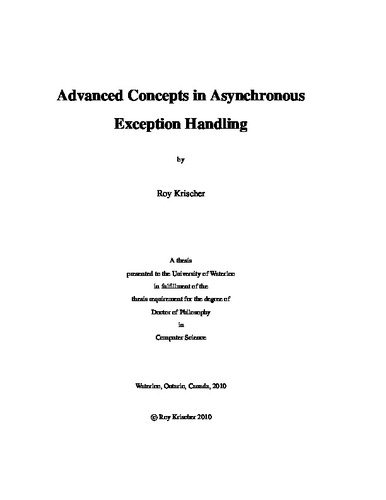| dc.description.abstract | Asynchronous exception handling is a useful and sometimes necessary alternative form of communication among threads. This thesis examines and classifies general concepts related to asynchrony, asynchronous propagation control, and how asynchronous exception handling affects control flow. The work covers four advanced topics affecting asynchronous exception-handling in a multi-threaded environment.
The first topic is concerned with the non-determinism that asynchronous exceptions introduce into a program's control-flow because exceptions can be
propagated at virtually any point during execution. The concept of asynchronous propagation control, which restricts the set of exceptions that can be propagated, is examined in depth. Combining it with a restriction of asynchrony that permits propagation of asynchronous exceptions only at certain well-defined (poll) points can re-establish sufficient determinism to verify a program's correctness, but introduces overhead, as well as a delay between the delivery of an asynchronous exception and its propagation. It also disturbs a programmer's intuition about asynchronous propagation in the program, and requires the use of programming idioms to avoid errors.
The second topic demonstrates how a combined model of full and restricted asynchrony can be safely employed, and thus, allow for a more intuitive use of asynchronous propagation control, as well as potentially improve performance.
The third topic focuses on the delay of propagation that is introduced when a thread is blocked, i.e., on concurrency constructs that provide mutual exclusion or synchronization. An approach is presented to transparently unblock threads so propagation of asynchronous termination and resumption
exceptions can begin immediately. The approach does not require additional syntax, simplifies certain programming situations, and can improve performance.
The fourth topic explores usability issues affecting the understanding of (asynchronous) exception handling as a language feature.
To overcome these issues, tools and language features are presented that help in understanding exception handling code by providing additional run-time information, as well as assist in testing.
For all topics, the necessary extensions to the syntax/semantics of the
language are discussed; where applicable, a prototypical implementation is presented, with examples that demonstrate the benefits of the new approaches. | en |

